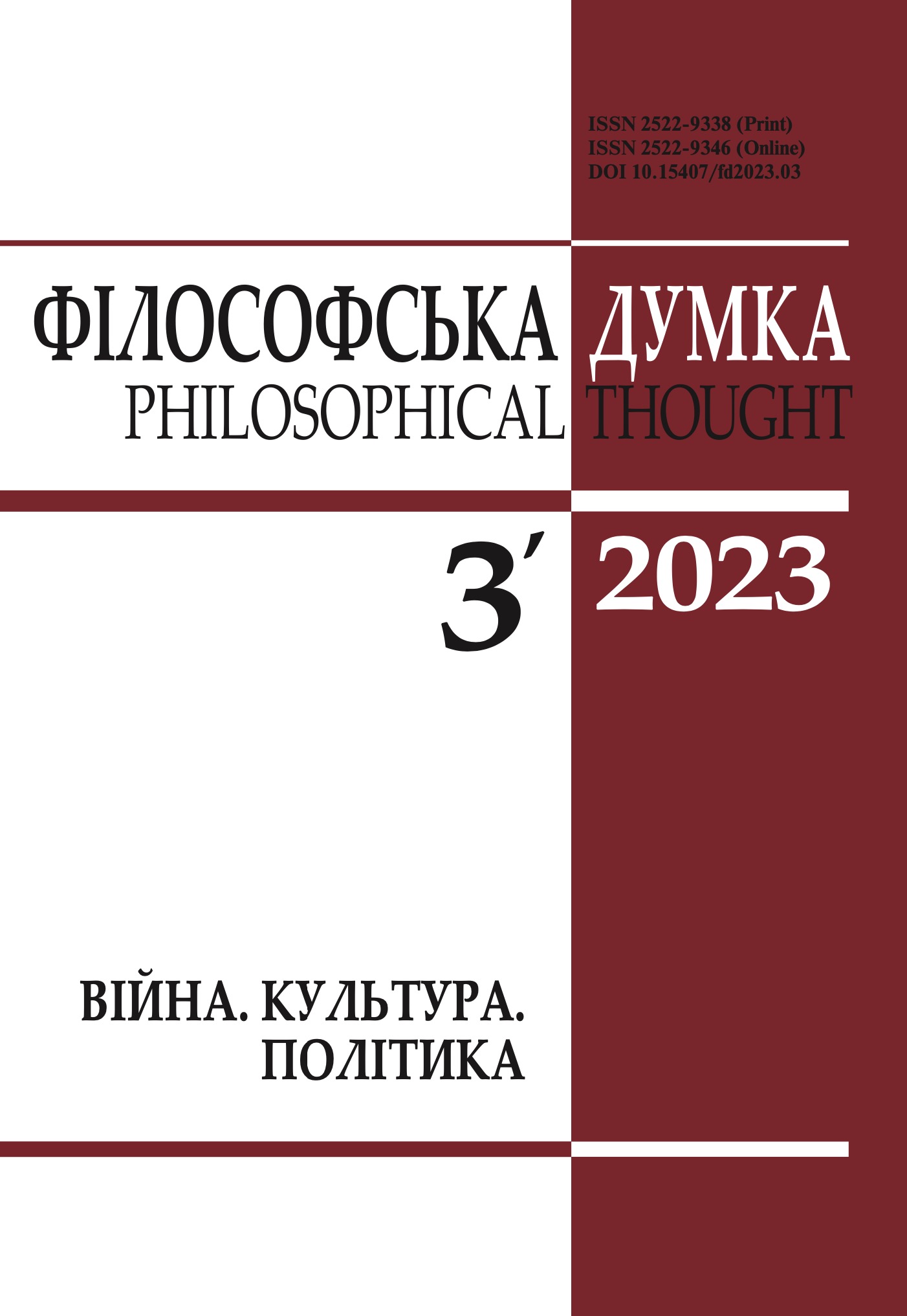HISTORICAL NARRATIVES: PROPAGANDA, WAR, POLITICS OF RECONCILIATION
DOI:
https://doi.org/10.15407/fd2023.03.059Keywords:
historical events, propaganda, war, mass media, politics of reconciliation, positive reading of one’s own history, politics of national unityAbstract
The article examines three dimensions of the interpretation of both historical and modern war events as they are perceived and undretstood at the level of official propaganda. First, it indicates that consequences of such propaganda are various manifestations of violence, and particular in many cases the emergence of repressive regimes and wars. Second, the article raises the issue of “politics of reconciliation”, the interpretive basis of which is a compromise reading of historical events by participants of conflicts or hostilities. Since propaganda can affect not only interstate relations, but, above all, serve the need for domestic policy formation, the author of the article also pays attention to the interpretation of historical events within a country. In this context, the propagandists explore the idea of “positive reading of one’s own history”, i.e. they are focusing attention on those events that had a positive impact on the life of society. The other leading idea, which is used by propaganda to maintain unity in the state, is the idea of “policy of national unity.” The article concludes about the relevance of study of the phenomenon of propaganda, in particular due to new opportunities developed by modern social media. The author emphasizes the ability of propagandistic interpretations of events to disorient and engage citizens that will largely efect on which political forces a person will support in electoral races. Therefore, there is a need to develop a clear strategy for interpreting the events of history, filtering the mass media space from various manifestations of information distortion. And after all, the process of state formation involves, among other things, the implementation of a number of measures aimed at establishing national unity, i.e. «policy of national unity».
References
Bazin, A. (2009). Creating a common historical narrative: commissions of historians — architects of reconciliation [In Ukrainian]. In: Europe and its painful past / Under the comp. of G. Mink and L. Neumayer in coop. with P. Bonnard; trans. from french: E. Marichev, ed. by T. Tsymbal (pp.105–118). Kyiv: Nika-Tsentr.
Bourdieu, P. (2009). On television and journalism / Trans.: M. Voznyak. [In Ukrainjan]. Yi: In dependent Cultural Studies Journal, 59, 28–40.
Dakh, H. von (2018). Total Resistance: Instructions for waging a small war for everyone. Part 1 / Trans. from German: C. Nazarkevych; ed. by O. Feshovets. Lviv: «Astrolabia» Publishing House.
Dakh, H. von (2016). Total Resistance: Instructions for waging a small war for everyone. Part 2 / Trans. from German: C. Nazarkevych; ed. by O. Feshovets. [In Ukrainian]. Lviv: «Astrolabia» publishing house.
Europe and its painful past. (2009) / Under the comp. of G. Mink and L. Neumayer in coop. with P. Bonnard; trans. from French: E. Marichev; ed. by T. Tsymbal. Kyiv: Nika-Tsentr.
Koselleck, R. (2004). The unknown soldier as a national symbol in Europe. [In Ukrainian]. In: Histo rical search for identity: Ukrainian-German colloquium. June, 2000 / R. Koselleck, J. Scher rer, K. Sigov; ex. ed.: K. Sigov , L. Finberg ; text prep.: Z. Kosytska (pp. 20–39). Kyiv: Duh i litera.
Koselleck, R. (2004). Political cult of the dead. Monuments to soldiers in modern times. [In Uk rainian]. In: Historical search for identity. Ukrainian-German Colloquium - June, 2000 / R. Ko selleck, J. Scherrer, K. Sigov; ex.ed.: K. Sigov, L. Finberg; text prep.: Z. Kosytska (pp. 40–73). Kyiv: Duh i litera.
Lara, P. de. (2018). Disinformation and propaganda in the post-truth era. [In Ukrainian]. Filosofska dumka, 5, 36–44.
Levi, L. (2009). Afterword. [In Ukrainian]. In: Europe and its painful past / Under the comp. of G. Mink and L. Neumayer in coop. with P. Bonnard; trans. from French: E. Marichev; ed. by T. Tsymbal (pp. 259–260). Kyiv: Nika-Tsentr.
Neumayer, L. (2009). Conclusions. Reconciliation — variations on European theme. [In Uk rainian]. In: Europe and its painful past / Under the comp. of G. Mink and L. Neumayer in coop. with P. Bonnard; trans from French: E. Marichev, ed. by T. Tsymbal (pp. 246–258). Kyiv: Nika-Tsentr.
Pomerantsev, P. (2020). This Is Not Propaganda. Adventures in the War Against Reality / Trans. from Eng.: O. Forostyna. [In Ukrainian]. Kyiv: Yakaboo Publishing.
Rüsen, J. (2010). New ways of historical thinking / Trans. from German: V. Kamianets. [In Ukrainian]. Lviv: Litopys.
Schnapper, D. (2007). Community of citizens. About the modern concept of the nation / Trans from French: R.V. Marder; illustrator: A.S. Lenchyk. [In Ukrainian]. Kharkiv: Folio.
Downloads
-
PDF (Українська)
Downloads: 419
Published
How to Cite
Issue
Section
License
Authors who publish with this journal agree to the following terms:
- Authors retain copyright and grant the journal right of first publication.
- Authors are able to enter into separate, additional contractual arrangements for the non-exclusive distribution of the journal's published version of the work (e.g., post it to an institutional repository or publish it in a book), with an acknowledgement of its initial publication in this journal.
- Authors are permitted and encouraged to post their work online (e.g., in institutional repositories or on their website) prior to and during the submission process, as it can lead to productive exchanges, as well as earlier and greater citation of published work (See The Effect of Open Access).


